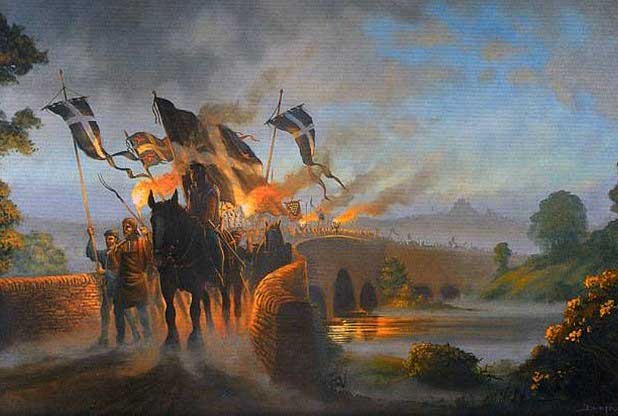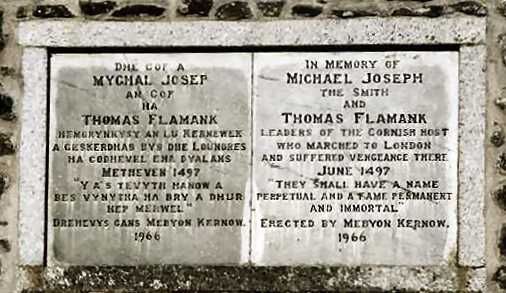I ‘m looking at the dramatic painting by Donald MacLeod called Crossing the Tamar – the Cornish Rebellion. Under flaring torches and waving banners of St. Piran, An Gof and Thomas Flamank (the only man on horseback) lead what is called “the pitchfork army” across the Tamar. It’s a triumphal scene, though “pitchfork army” fails to give credit to the most effective Cornish weapon, the longbow, for which they had been famed since Agincourt. Awed Londoners reported that Cornish arrows were “the length of a taylor’s yard, so strong and mighty a bow the Cornishmen were said to draw”.

The story of An Gof’s rebellion has been told many times, but it always seems to stop at June 19th, when the Cornish had been surrounded and Flamank and Lord Audley captured. An Gof himself fled for sanctuary to Greenwich but was caught before he reached the Friars’ Church. Royal justice in those days was swift and violent. Within a week, on June 27th, An Gof and Flamank were hanged, drawn and quartered at Tyburn and next day Audley was beheaded on Tower Hill. It was all over. Or was it?
Historians tell us that 15,000 Cornishmen marched to Blackheath, at a time when the total population of the county was about 69,000.
This implies virtually the entire adult male population capable of marching and fighting. We may allow for some exaggeration and for some recruitment from Devon as they passed through, but it is still a remarkable evidence of the whole-hearted support which the movement had developed. It was disappointing for them that they found no support from the other counties, not even from Kent with its long tradition of anti-government revolt, even though it is said that they were careful and disciplined enough not to pillage and steal. There is evidence that the people of the southern counties helped them to a certain extent with food and shelter, but were not willing to risk their lives in such a hazardous venture. So they moved on to the south bank of the Thames, near Deptford.
We read that in that last tense night on Blackheath, looking down over London and seeing the urgent defensive preparations going on in the city, many of the rebels lost their nerve and began to slip away. An Gof spent the night, like Henry V before Agincourt, trying to boost morale. but many of them realised that their cause was lost and wanted to surrender to the King’s mercy and put their complaints to him without bloodshed. Five or six thousand, it is said, stole away that night, so that the rebels were left with only perhaps nine thousand against the royal army of 25,000.
The fighting was soon over. The Cornish archers inflicted some casualties but without cavalry or guns and surrounded on three sides, they were quickly overwhelmed. There was no terrible massacre; we must presume that the Cornish simply fled from the field and hid successfully in the surrounding country.
Without their leaders they were no longer an army. There were some of the gentry with them, John Trevysall, William Antron, Rosewarne, Retallack, Borlase, Polgrene – their names read like a heroic Cornish saga – and no doubt they would have tried to rally their own countrymen to get home safely. But many must have had a hard time, sleeping rough, perhaps marching during the short summer nights to avoid being seen by ill-wishers, drinking from streams and always hungry, tired and footsore. A long hard journey and it is impossible to believe that they survived without a little thieving from local farms as they passed. They were more than weary; they were angry. Their complaints, which lawyer Flamank had insisted were legally justified, had not even been heard. Their leaders had been executed, some of their friends had been killed or wounded. The whole expedition, which had started with such high hopes and glorious intentions, (those flaunting banners as they crossed the Tamar) had been a disaster. They were not just beaten, they were humiliated.
As they struggled and straggled home, their resentment must have grown. It is difficult for us now to imagine how remote Cornwall was in those times, and how different they felt from the English foreigners who ruled them. For a start, most of them still spoke Cornish and understood very little English. It is thought that West Cornwall was still entirely Cornish-speaking. A Venetian visiting Cornwall in 1506 wrote: “We are in a very wild place which no human being ever visits, in the midst of a most barbarous race, so different from Londoners and the rest of England that they are as unintelligible to these as to the Venetians.” Separated from the rest of England by distance, language and culture, they felt themselves to be a separate country.
This remoteness was emphasised, right up to the present century and the coming of the motor car, by the slowness of travel. Visits to market were rare and often on foot, by the even slower ox-cart, or by the tough little Cornish ponies “hardly bred, coarsely fed, low of stature… most serviceable for a rough and hilly country”, as Carew wrote in 1602. From Bodmin to Truro was reckoned a good day’s journey. For a young man to go courting a radius of perhaps five miles to the next village was all that was practicable, so there was much inter-marrying between neighbours.
Even the gentry, it was said “were all cousins”. Exeter was impossibly remote; London was another country altogether. And although Columbus had made his epic voyage five years earlier, most people still thought of the world as a flat dish and Cornwall was perilously near the edge. A.L: Rowse wrote of this “insignificant corner of the land, with its own inner life of legends and superstitions and fears, its memories of Arthur and Mark and Tristan, lapped in religion and the cult of the saints…”.
And they were poor, scratching a miserable livelihood from the unforgiving soil, though no doubt their poverty was exaggerated when they were disputing taxation. The royal historian Polydore Virgil, explained that “the men of Cornwall, who live in a part of the island as small in area as it is poor in resources, began to complain that they could not carry the burden of taxation imposed for the Scottish war”. Such wealth as Cornwall produced had always been from tin, but at this time even the tinners were in decline, the tin-streams being largely exhausted and the technique not yet available for deep mining. The tinners, -so rough and mutinous a multitude, 10,000 or 12.000 the most strong men in England” must have formed the tough heart of the rebel army, and as they struggled back to Cornwall in the summer of 1497 they were in no mood to give in and pay a tax for such an impossibly remote war against Scotland.
A curious feature of the An Gof rising was the unusual leniency of the King to the rebels. Apart from the executions of the three leaders, there is no evidence of any more bloodshed, nor even of Henry’s favourite expedience of heavy fines. Polydore Virgil records that Henry “spared their lives out of consideration of their rustic simplicity” but goes on to say that the King heard that “those who had stayed at home were not cowed by the catastrophe that had befallen their fellows, but were still keen to begin a rebellion if roused in any way”. Cornwall was still seething with resentment and unrest and the provocation for a second rising was at hand.
This was in the person of a charming and persuasive confidence trickster called Perkin Warbeck, who landed near Land’s End in September 1497. Richly dressed and well-spoken with courtly manners, he had apparently already convinced the Scottish King James IV that he was what he claimed, Richard, Duke of York, the younger of the two princes, sons of Edward IV, whose disappearance in the Tower was then and still remains a mystery. Here was an upmarket new leader for the resentful Cornish. and many of them saw a chance for a second rising. this time surely with more support from up country. But this is another story for another time.
